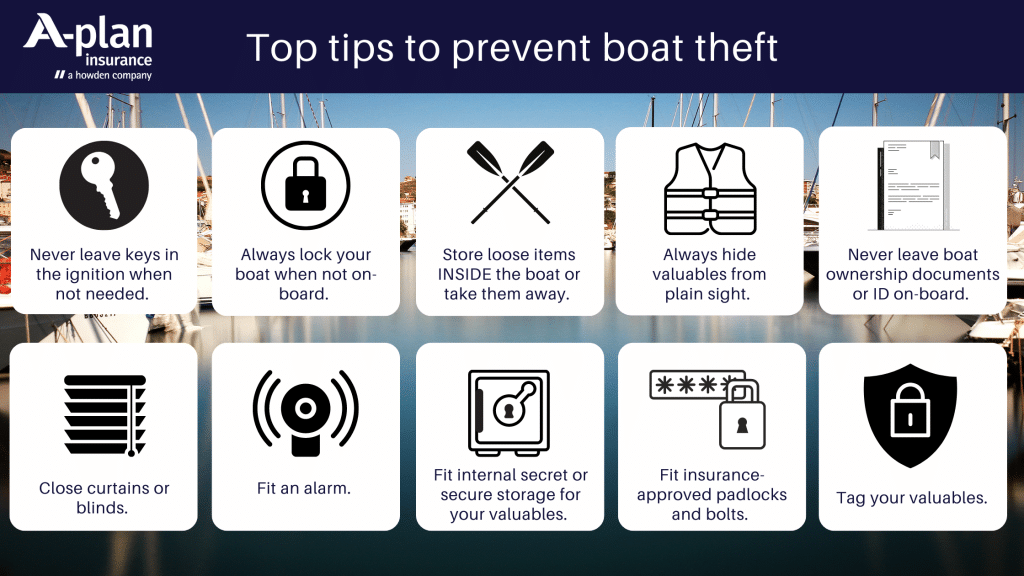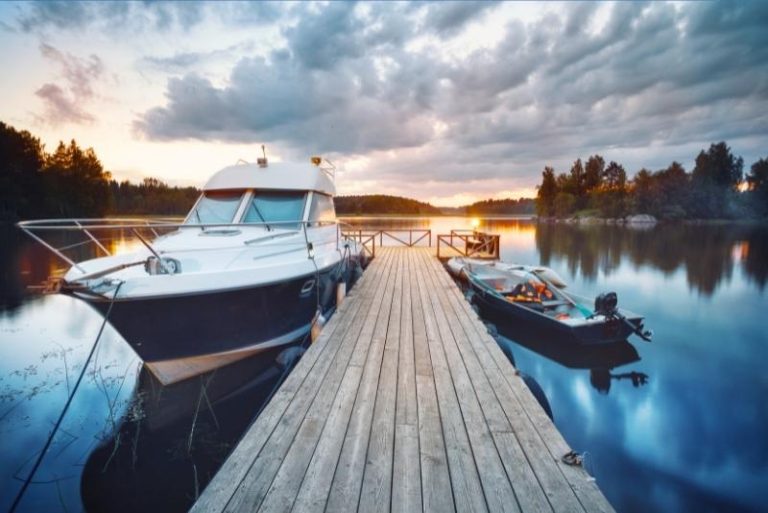Theft of boats and equipment causes heartache and financial loss to thousands of marine enthusiasts every year, regardless of size or value.
Unfortunately, much of this goes underreported as ‘general burglary’ by the authorities, as opposed to ‘marine crime’, which makes true statistics near-impossible to ascertain.
Common items stolen from boats tend to be those easily picked up and carried away by opportunists. Outboard motors and generators; marine communication and navigation equipment; tools/toolboxes; and personal belongings are most common. As many items are so readily stolen, transported and altered, it’s easy to see why criminals have turned their attention to the marine world, so how can you prevent this?
Yvonne Hall, our A-Plan Marine expert, has some top tips to help keep your boat safe.
Check your boat for vulnerabilities
Take a ‘risk assessment’ approach and review your own security vulnerabilities.
- What items are loose/detachable on the outside of the vessel?
- What’s on display inside the vessel?
- Where could entry be most easily forced?
- Is the mooring too concealed (particularly important to consider when on tour/cruising)? Or, adversely, is the mooring too accessible?
Write down the issues you find, weight them in order of greatest impact and risk, and decide what actions to take to mitigate this risk.
Secure your boat properly
It sounds straightforward, however it is worth checking that you have outboard locks. Outboard locks secure your engine to your boat, and are suitable for all outboards, not just smaller boats. Insurers require that, in order for theft to be covered within terms of the policy there must be evidence of an outboard lock fitted that has been specifically designed and manufactured as such.
Outboard locks for mid-sized and larger outboards incorporate a a clamp lock and an outboard motor bolt lock, to provide additional security. It is suggested that larger outboard engines should be bolted through the transom and a suitable outboard motor lock fitted.
We always recommend our clients takes a photo of outboard with lock fitted as proof in the event of a claim.
Other locks:
- Install inside hinges and deadbolt locks on all doors.
- Secure ports and windows with inside auxiliary locks.
- Attach inverted strong hasps and padlocks to all hatches.
- Lockers should be secured with non-removable hasps and hinges and secured with strong padlocks.
- Make use of wheel locks & hitch locks.
Tag and list your valuables
Engrave or data tag all valuables (electronic equipment, engines, sails, radios and other loose gear) with your name, home port, telephone number and the boat’s hull identification number. Maintain an inventory list ashore of all boat gear. Include name, model, serial number, manufacturer and description.
Parking trailered boats at home
For speedboats, RIB’s, small cruisers, dinghies or any other water craft that you trailer every time you use them, we would recommend storing them somewhere near your home. Storing at home, on your residential driveway, is only a really viable option if you implement the appropriate security measures.
For example, locking retractable posts in the gateway are good – but lockable gates are better. If you aren’t able to have either, consider concreting a post or loop into the ground (ground anchor) and use motorcycle locks and/or chains to secure the trailer. There are commercial products available that you can use for this.
A hitch lock will prevent the trailer from being towed away easily. Some cover the hitch completely and others just fit into the hitch socket to prevent a tow ball being inserted. It’s also worth parking the trailer ‘nose-in’, just to add an extra barrier for thieves.
Install a boat alarms or alarm systems
While some marinas may have CCTV which you may have access to, many don’t. This is why it is important to take security into your own hands.
- Activate your alarm system every time you leave your boat.
- There are many different types of anti-theft alarms for boats, alarm systems chosen should be specifically designed for marine use. Because of the damp marine environment, alarm sensors and electronics must be properly protected.
- Types of alarms include ones that detect movement and set off a siren to cameras that will text you pictures if they are set off. Other systems may contain trackers that will broadcast a stolen boat’s location. And some combine all of these facilities in one unit.
Top tips to prevent boat theft – Summary

Be vigilant:
- Always close/lock gates and lockable onsite facilities behind you.
- Be on the lookout and question the identity of strangers.
- Point out obvious security flaws to fellow boaters.
- Keep an eye on other boats as well as your own.
- Report any suspicious activity to the police, marine security personnel or yard masters.
If you are a victim:
If you are a victim of a theft, vandalism or other criminal offence, you should notify the police immediately, even if you are not intending to claim from your insurance policy It’s important to keep a record of all serial numbers for valuable articles and store them away from vessel, and obtain a crime reference number from the police – this information will be requested by your insurer.
If you have questions, or are wondering whether your vessel is sufficiently insured and fully covered for damage and theft, please do feel free to contact A-Plan Marine in Parkstone, near Poole Harbour, on 01202 725 165

